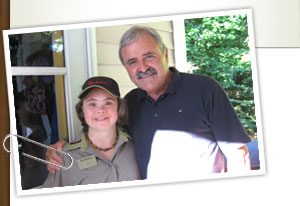Social Challenges
Similar social challenges face many families who are isolated and need some kind of support, whether because of illness of a family member, hard times or the needs of members who have disabilities.
1. “I feel very alone as a parent.”
In the survey we conducted, the single most often repeated advice from families was to work hard to develop a support network of friends and relatives who are committed to you and willing to get to know your family member who has a disability, and to begin this as early as possible.
Think about anyone you know who has ever taken an interest in you or your family. Some families actually moved to a new location where they would be more likely to form such a network. The section on Network-Building offers some approaches that have borne results.
This document contains some links to organizations and resources for Aboriginals with intellectual disabilities.
2. “The Lack of Reciprocity between Families is Discouraging”
Families complain that other families of people with disabilities rarely return invitations. They also say that their family members try to make plans with others from school or out in the community only to have no follow-through from those individuals.
Finding reciprocity can certainly be a struggle but the rewards for your family member will be great. The young people see that they are not alone in being different.
EF, QC
Some suggestions:
Suggest a time for a coffee shop chat with one other likely parent simply to share about needs. Often the first step is to break through the sense of loneliness and isolation.
Address the situation directly with the other family: “If we host a gathering, or drive, this month, will you do so next month?” Try to set up a contractual relationship with ground rules and clear parameters.
Accept that some families will just not come around—or not as far as you expect. This is not just true among families of young people with disabilities. Hockey and soccer parents complain of a similar pattern (e.g. someone does a disproportionate amount of the driving). For the sake of your child, you may have to be willing to do the extra. Meanwhile, keep looking for other families who will reciprocate.
3. “Resistant Public Attitudes mean that my Son often Feels Unwelcome”
This is a painful experience for any parent. Getting together with other families may be helpful. In terms of changing attitudes, the best remedy here is the spreading of good news stories of friendships that are mutually enriching, and the actual modeling of such friendships by the friends themselves when they are out and about.
Friends or family who reveal the enjoyment they take in being together can open closed minds and help those who are afraid because they don’t know how to relate to someone who is different. If your child is still in school, talk to the teachers. They can help a great deal with such modeling, as can educational assistants and student peer leaders.
Sometimes, you may be able to arrange for a pair of friends to talk about their friendship to a community or faith group or service club.
“I just take him to whatever community function is going on to meet the neighbours. That helps a lot.”
Garth, PEI
4. “My Child is Not Interested in People”
Some people are just more attracted to other things or activities than people. However, people who are not drawn to relationships can still have friends. More time may be needed for a connection to develop.
Try to invite people into your circle who have already discovered the gift of relationship with someone who seems distant. Some people also have a particular medium for connection, such as artwork or music, even a particular song, or a favourite swing.

Just Being with Others Helps
“Even if she does not pay much attention, my daughter has always been in contact with other people. She has developed a certain capacity to socialize just simply by her frequent contact and in spite of having little interest in these peers.”
Family Member, QC
This document provides some resources for young adults on the Autism spectrum, as well as their family members and educators.


